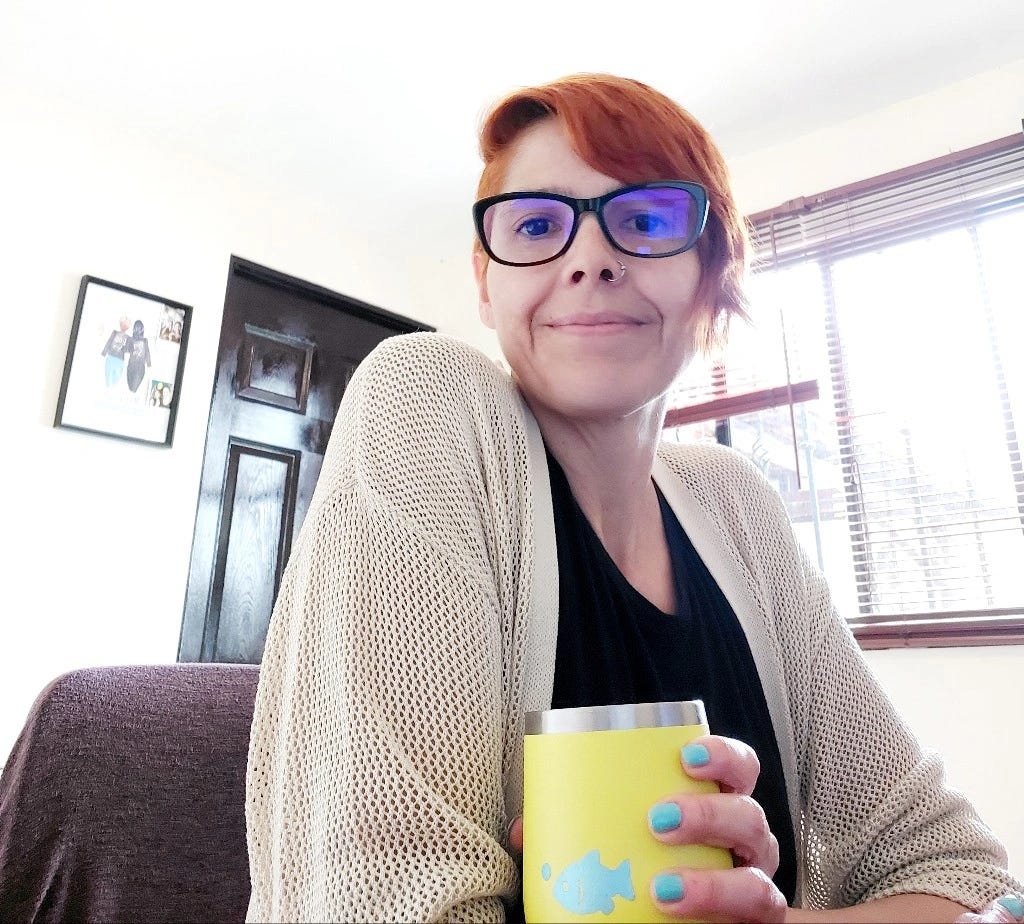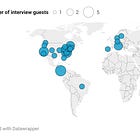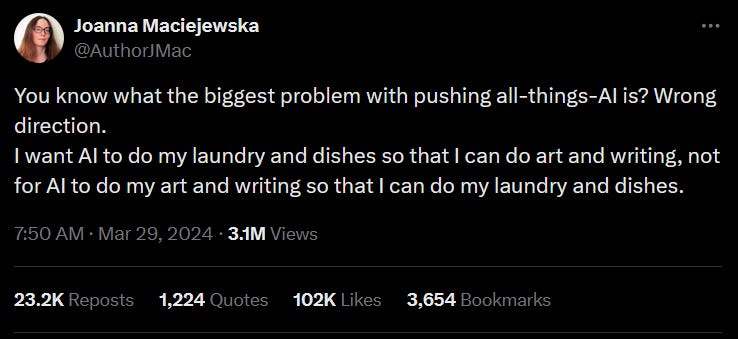📜 AISW #032: Lis Sandi-Diaz, Costa Rica-based engineering program manager (AI, Software, & Wetware interview)
An interview with Costa Rica-based engineering program manager Lis Sandi-Diaz on her stories of using AI and how she feels about how AI is using people's data and content.
Introduction - Lis Sandi-Diaz
This post is part of our 6P interview series on “AI, Software, and Wetware”. Our guests share their experiences with using AI, and how they feel about AI using their data and content.
Note: In this article series, “AI” means artificial intelligence and spans classical statistical methods, data analytics, machine learning, generative AI, and other non-generative AI. See this Glossary and “AI Fundamentals #01: What is Artificial Intelligence?” for reference.
Interview - Lis Sandi-Diaz
I’m delighted to welcome Lis Sandi-Diaz from Costa Rica as our next guest for “AI, Software, and Wetware”. Lis, thank you so much for joining me today! Please tell us about yourself, who you are, and what you do.
Most people call me Lis. I’m from Costa Rica. I’m a mother of a challenging smart 8-year-old boy. We are a small family of 3, sometimes 4 (I have an 18 y/o stepson too). We have 3 dogs, two of which are 3-month puppies, so my home tends to be loud and busy.
Although I hold a license degree in Physical Therapy (2007), I have a +15 year career as a Project Manager for the IT and Software Development industry. I’m currently a Program Manager at Wind River (2021), where I have had the opportunity to work closely with the Security Office on the implementation of the secure development lifecycle1 framework. Here I have learned more about technology and security than in my entire career, because of the people I have met here and their willingness to teach, develop technology and build team collab. This has enabled me to grow in the area, and so has my interest in technology. I don’t say this a lot, but I have been trying to move away from the technical scope of industry for several years, but I always end up coming back to it, and every opportunity drags me - in a good way - into the next level :)
Wow, Lis, you have your hands full! Especially with two puppies; house-training can be a lot of work 🙂
What is your level of experience with AI, ML, and analytics? Have you used it professionally or personally, or studied the technology?
My level of experience with AI and ML is minimum, though I must confess my interest is growing every day. I hear from friends about things they do with AI to entertain their kids and teach them about it. My son seems to be leaning towards becoming a tech-savvy kind of kid, so I have this feeling that in a few years he will teach me instead.
I hear this from other parents as well! Keeping kids safe online can be a huge challenge nowadays, too. I learned a lot about this from my friend Angeline Corvaglia; she runs a Data Girl and Friends materials for keeping kids safe online.2
In the Costa Rica educational system, do you know if they are using AI-based tools, or planning to use them? Maybe at higher grade levels?
I'm not aware of any initiative in our educational system around the use of AI-based tools, but I do know that some private schools are starting to explore the possibility and are already using ChatGPT as part of their technology class.
Can you share a specific story on how you have used a tool that included AI or ML features? What are your thoughts on how the AI features [of those tools] worked for you, or didn’t? What went well and what didn’t go so well?
Yes, the most useful I have found so far is “True Caller”. I don’t think I have answered a phone call from a bank offering me any “new opportunity” to spend my money ever since I installed it several months ago. There are other marketing excessive call volumes I avoid also by using this app; blocking numbers function is very useful.
I use Waze to move around, but only if I don’t know where I’m going … Costa Rica is a small country and those of us who are old enough to have survived all possible technological transformation eras - without a smartphone- can enjoy the benefit of still knowing our way around the streets, towns and regions. It's our super power!
You’re right - in fact, researchers have studied spatial skills and GPS usage. People who rely less on computer navigation and more on manual map-reading and navigation retain higher levels of skill. 3
And they don’t get lost whenever cell service is unavailable for whatever reason :)
If you have avoided using AI-based tools for some things (or anything), can you share an example of when, and why you chose not to use AI?
There are simple things I avoid using AI for: I have never used ChatGPT, I don’t use predictive text features in my phone, and I don’t use summarizing call tools either (though this is a big part of my daily work function).
One thing that concerns me about AI is that feeling of how much information I’m providing, and making it of public use, not knowing what it can be used for, with or without my consent. All our data is already somehow exposed and it feels like we lost control of our own information (fraudulent purchases with my credit and debit cards are the best example probably).
Those are all very valid concerns, Lis 👍🏼
But there are other reasons; in my home we limit the use of “smart devices” to phones and TVs mainly (almost inevitable). We don’t use Alexa or any other similar device, not for music playing, not for videos, not for turning on/off lights. We don’t use voice commands on the devices we have. We try to keep our lives as far away as possible from these types of practices. We don’t think it’s wrong to use them, either, we just limit them.
You sound like me 🙂 We turn off most ‘smart’ features in our home - although maybe not for the same reasons.
The way I like to think about this is, I like to keep my life and surroundings simple but at the same time active. I don’t want to lose doing the simple things I can do on my own. I still do phone calls (lol), I stand up to turn on and off lights, I still search for answers in books or dictionaries. I think for us as a family, where both parents have busy jobs, it's important sometimes to move away from the accelerated day-to-day routine. These small things help us stay connected to what we believe is a healthier, slower and balanced lifestyle that our family needs.
It sounds like you are being deliberate about how and when you choose to use technologies, based on your family’s values. I think that’s very wise.
I cannot avoid thinking about what are those unique human abilities we need to keep intact to be successful in the future world, and how AI will impact the development of those abilities for our next generations? Would we overcome AI? Would the extensive use of AI impact positively to a majority of society by enabling significant advances in nutrition, medical industries for example? Hopefully yes, but how do we limit the use of AI for not-so-positive situations: armed conflicts, fraud and other crimes?
All great questions, Lis! (And if you’ve heard about people talking about “superalignment” or “responsible AI” work, these are some of the questions those people should be trying to address.4)
A common and growing concern nowadays is where AI and ML systems get the data and content they train on. They often use data that users put into online systems or publish online. And companies are not always transparent about how they intend to use our data when we sign up.
How do you feel about companies using data and content for training their AI/ML systems and tools? Should ethical AI tool companies be required to get consent from (and compensate) people whose data they want to use for training?
For sure, ethical use of the data is part of what concerns me as a user, though I might not own any intellectual property myself. I also think it's ethical to not use others’ IP without the proper disclosure and consent. It’s a challenge and very tempting, because the main focus of how it's been presented is how it's making our life and daily work easier by utilizing ML and AI tools to support our functions. But, is that true long term?
Great point. And there’s certainly a lot that smart tools can do to make our lives and daily work easier. One concern I hear a lot, though, is that this isn’t where the bulk of the AI research effort is going. One post that went viral earlier this year said, “I want AI to do my laundry and dishes so that I can do art and writing, not for AI to do my art and writing so that I can do my laundry and dishes.”5
I read it and I loooooved it too! I don't want smart devices to be smarter than me either haha :)
Another matter of concern is the amount and type of data coming from public sources and if that data is in any way filtered for the users; is AI guaranteed to be used to do good only? How have my own inputs to AI been used?
Yes, data sourcing and purposes are huge concerns. AI companies are businesses first and foremost. So we don’t have any guarantees about AI technologies only being used for good. And we don’t have laws and regulations in place worldwide, yet, to require them to be transparent about how they’ve used our data and inputs.
Do you know of any company you gave your data or content to that made you aware that they might use your info for training AI/ML? Or have you ever been surprised by finding out that a company was using your info for AI? If so, did you feel like you had a real choice about opting out, or about declining changes to the terms and conditions?
I personally have no trust at all that my data is used safely or that any company in any industry safeguards my integrity anywhere in the world and as users it does feel we have no options. I mean, your data is already everywhere: in the bank (directly linked to your money!), airports, supermarkets, transport services, school online support tools, online shopping… For many of these services you cannot opt out: you have to do international travel for work, for example, and electronic payment methods are sometimes the only payment option…
At the same time, every day companies replace customer support with AI or bots, making it more difficult sometimes to file a complaint and get a responsible actor on the other side to take care of it…
Yes, that’s happening more and more often. My guest Kris Holland shared a story in his interview about his experience trying to get Dell customer support on a laptop he helped a friend order.
Has a company’s use of your personal data and content created any specific issues for you, such as privacy, phishing, or loss of income? If so, can you give an example?
Certainly, in the last 5 months, twice I have been a victim of fraud in both my debit and credit cards. I did my own research and found one of the places that processed one of those online purchases is actually owned by my bank. I have a high level of certainty that this is due to a data breach or an intentional criminal insider act.
Ugh, that sucks! One fraud incident is bad enough, but two in five months is awful 😞
In addition to that, I recently bought the house where we live. Ever since, I get all sorts of calls from almost every bank operating in national territory offering anything from insurance, credit cards and financial packages to “upgrade” my loan or anything else. I use the True Caller app and have not answered a phone call since then (ok, thumbs up here for AI!)
That’s good! I should check out True Caller myself :)
Public distrust of AI and tech companies has been growing. What do you think is THE most important thing that AI companies need to do to earn and keep your trust? Do you have specific ideas on how they can do that?
Parental controls are probably a must, if not available yet; requesting personal information and data usage should be kept to a minimum. There’s a tendency to ask for your information for almost everything: customer service surveys, for example, but if I was a customer, don’t you have my info already? Maybe a membership requirement could be another way to limit some sort of content usage.
I really don’t know how inputs can be in some way limited so that only copyright and disclosed usage is available. For sure, copyright and intellectual property legislation will evolve to adapt to the need.
That’s true, for sure. Is there anything else you’d like to share with our audience?
Thanks for inviting me to contribute to this project, I feel honored. You will not believe how much I have learned and how much introspective it provided by just answering these questions!
I’m so glad you enjoyed doing the interview, Lis! Thank you so much for sharing your time and thoughts on AI with me and our audience.
Interview References and Links
Lis Sandi-Diaz on LinkedIn
About this interview series and newsletter
This post is part of our 2024 interview series on “AI, Software, and Wetware”. It showcases how real people around the world are using their wetware (brains and human intelligence) with AI-based software tools or being affected by AI.
And we’re all being affected by AI nowadays in our daily lives, perhaps more than we realize. For some examples, see post “But I don’t use AI”:
We want to hear from a diverse pool of people worldwide in a variety of roles. If you’re interested in being a featured interview guest (anonymous or with credit), please get in touch!
6 'P's in AI Pods is a 100% reader-supported publication. All new posts are FREE to read (and listen to). To automatically receive new 6P posts and support our work, consider becoming a subscriber (it’s free)! (Want to subscribe to only the People section for these interviews? Here’s how to manage sections.)
Enjoyed this interview? Great! Voluntary donations via paid subscriptions are cool; one-time tips are deeply appreciated; and shares, hearts, comments, and restacks are awesome 😊
Series Credits and References
Microphone photo by Michal Czyz on Unsplash (contact Michal Czyz on LinkedIn)
End Notes
Angeline Corvaglia founded and runs a Data Girl and Friends initiative for keeping kids safe online. Links to check out:
“Habitual use of GPS negatively impacts spatial memory during self-guided navigation”, Louisa Dahmani & Veronique D. Bohbot / Nature - Scientific Reports volume 10, Article number: 6310 (2020)
“Finding a new way: Orienteering can train the brain, may help fight cognitive decline”, Jennifer Heisz, Emma Waddington / McMaster University, 2023-01-20
PLOS ONE journal article: Waddington EE, Heisz JJ (2023) Orienteering experts report more proficient spatial processing and memory across adulthood. PLoS ONE 18(1): e0280435. https://doi.org/10.1371/journal.pone.0280435
“Microsoft lays off team that taught employees how to make AI tools responsibly”, by Zoë Schiffer and Casey Newton / The Verge, 2023-03-13
“OpenAI’s Long-Term AI Risk Team Has Disbanded”, by Will Knight / Wired, 2024-05-17
Viral post on X by Joanna Maciejewska, a fantasy and sci-fi author:









Happy Thanksgiving!